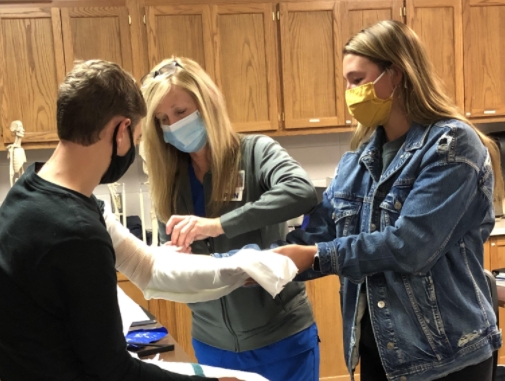During the 2020-21 school year, Northwest Technical School Health Sciences Instructor Bing Boettner has had to rethink the curriculum for the program.
Cutting to the core of the program, Boettner has rebuilt revolving around resilience, creativity and resolve.
The health science program is a two-year program to prepare students interested in the health care field. It is open to high school juniors or seniors. During year one, a student studies for and can become a certified nurse assistant (CNA).
In year two, the student works a four-day week at a nursing home with a cooperative agreement with NTS for extended clinical practice. On Fridays, the student is in the classroom, working on special assignments and other course work.
Resilience is the word for Boettner and her students as the program dealt with the COVID-19 pandemic. Missouri had also changed the date of the CNA examination to November instead of May.
The program recovered quickly from these two challenges. Boettner changed the curriculum to prepare her students for the exam. The state also issued a waiver to allow 16 hours of training in the lab instead of the normal 100 hours.
“I feel like I’m teaching for the first time,” Boettner said. “I had to make modifications to my standard based topics and project timelines. We had to go with the flow while maximizing learning in the classroom.
“Since our clinical sites were closed to students, all of our on-the-job-training in the fall had to be done in the lab,” she explained. “For those students who were on quarantine, some procedures were demonstrated via Zoom. All students this year were able to complete and successfully pass the CNA state certifying exams as of December instead of waiting until May.”
Boettner is pursuing a once-a-week clinical experience for eight weeks in March and April in a local nursing home. With the opening up of the COVID-19 pandemic procedures, the vaccinations and the improvement of coronavirus testing, the students should be able to gain this experience.
Even though Maryville High School ran a hybrid schedule, NTS was instructing students five days a week.
“The kids showed up,” Boettner said. “Because of the limitations of COVID, I find that the things students are learning need to be of quality. Students need to be able to say that the day was worth it. You get rid of the fluff and focus on the subject of the curriculum. I really worked hard on preparing substance.”
Boettner has used creativity in teaching the curriculum. Simulators have proven their usability for students to practice their skills.
“We have availed the use of the North Central Missouri College lab at NTS which has several simulators that mimic labor and delivery, respiratory sounds, a geriatric simulator, to name a few,” Boettner said. “Using the Anatomy in Clay learning system and special shaped cookies for the organs of the body systems enhanced the psychomotor skills part of learning. Virtual tours of nursing homes and having healthcare guest speakers through Zoom liven up the unit on career exploration.”
Boettner met the situation with resolve to provide her students with the best learning experience.
“As the required 100 hours clinical experience was waived to just 16 hours along with completion of 64 procedures,” Boettner said. “I had to be resolute to find something else for the remaining hours. For the first time, health science students will be getting a nationally OSHA approved 10-hour safety certificate. It is a timely addition as we cannot be any more vigilant about safety these days.
“As members of SkillsUSA, health science students will also be able to obtain a credential after taking a nurse assisting essentials assessment,” she continued. “This assessment will help evaluate students learning by another worthwhile organization and at the same time meeting the curriculum’s state and national standards. SkillsUSA framework is embedded in this assessment which includes technical skills grounded in academics, workplace skills, and personal skills.”
The students are also preparing to participate in the SkillsUSA contest this month as well as in March.
NCMC Instructor Becky Wynne and Boettner have worked collaboratively with each program’s students to exchange services. Boettner connects her class to Wynne’s students and their patients via Zoom. Wynne and her students will be the main audience for the health science students project based learning undertakings.
The NTS Health Science program is 53 years old. In that time, there have been eight teachers including Boettner, who is retiring at the end of this school year.
With the pandemic, Boettner realized that whoever takes her place is inheriting a rich and varied curriculum to prepare students for the healthcare field.





Facebook Comments